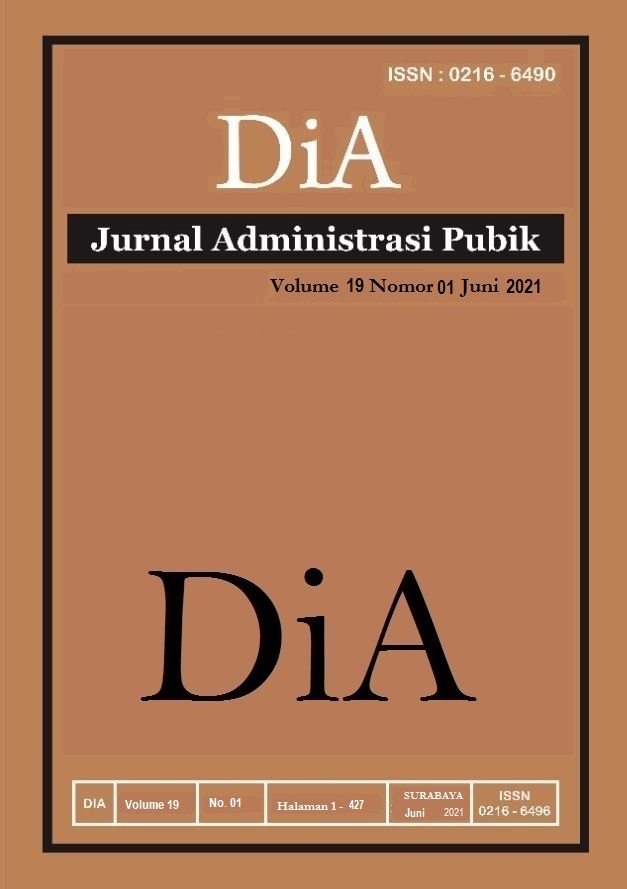THE INFLUENCE OF ORGANIZATIONAL CULTURE AND PERCEIVED ORGANIZATIONAL SUPPORT ON EMPLOYEE ENGAGEMENT WITH ORGANIZATIONAL COMMITMENT AS A MEDIATOR
DOI:
https://doi.org/10.30996/dia.v19i1.5205Abstract
The focus of this research is how to improve employee engagement at the PT.X head office by examining the relationship between organizational culture and organizational perceptions of employee engagement with organizational commitment as a mediator. This research uses quantitative approach, which is a study that aims to explain a cause of the occurrence of social phenomena, which the phenomenon will be explained by conducting an objective measurement. Primary data collection through the dissemination of questionnaires to 74 respondents. Data analysis using the partial least square equation model or can be known as SEM-PLS. Based on the results of research that has been found, it can be concluded that organizational culture variable does not give a significant direct positive influence on employee engagement, whereas when viewed on variables perceived organizational support and organizational commitment, these two variables have a significant positive direct affect on employee engagement. If the direct influence relationship between organizational culture and employee engagement does not have a significant influence, but when the variable is mediated by organizational commitment, then the results state that there is a significant positive influence relationship between the two variables. This shows that the organization's commitment to succeed has a significant role in mediating the relationship between organizational culture and employee engagement.
Downloads
References
Akbar. 2020. Organizational Trust dan Organizational Culture terhadap Employee Engagement melalui Satisfaction. Jurnal Ilmu Manajemen. P-ISSN : 2541-6030
Brown, et,.al. 2015. Culture and Engagement. Diakses pada https://www.deloitte.com/, 25 Oktober 2020.
Chin WW. 2000. Partial Least Squares for Researcher: An Overview and Prosentation of Recent Advances Using the PLS Approach, http://disc-nt.cba.uh.edu/chin/icis96.pdf [16 januari 2015]
Clark, Timothy. 2012. The Employee Engagement Mindset : The Six Drivers for Tapping into the Hidden of Everyone in Your Company. New York: McGraw-Hill
Claudianty, et al. 2020. Pengaruh perceived organizational support terhadap employee engagement. Jurnal fenomena. ISSN : 2662-8947.
Cook, and Wall. 1980. New work attitude measures of trust, organizational commitment and personal need non- fulfilment. Journal of Occupational Psychology, vol 53, 0305-8107.
Eisenberger. 1984. Format for the 8 item survey of perceived organizational support. Diakses pada https://www.classweb.uh.edu//.
Frinlicia, dan Medina. 2016. Perceived Organizational Support Effect Rewards and Recognition and Spirituality on Employee Engagement. Business and Entrepreneurial Review, Vol 15, no 2. ISSN 0853-9189
Gallup Organization. 2020. diakses pada https://www.gallup.com//.
Haim, Aviad. 2007. Organizational Commitment : The Case of Unrewarded Behavior. Israel :
World Scientific
Jung, et al. 2007. Instruments for the exploration of organizational culture- Compendium of Intsruments. Working Paper, University of St Andrews.
Kahn, W. A. 1990. Psycological conditions of personal engagement and disengagement at work.
Academy of Management Journal vol 33, 692-724.
Koeng, Nick. 2013. Employee Engagement, Job Attitudes, and Work Behavior: A Meta Analytic Test of The Incremental Validity of Employee Engagement. A Literature Review. University of Missouri- Columbia.
Krishnan, Gokula. 2013. Correlates Employee Engagement With Turnover Intention. Intercontinental Journal of Human Resource Research Review, vol 1 issue 9, 2320-9704
Mowday,. et al. 1982. Employee organization linkages. The psychology of commitment , absenteeism and turnover. New York : Academic Press.
Meyer, Allen. 1991. A three components conceptualization of organizational commitment.
Human Resource Management Review vol 1.
Mohan,. Et al 2018. Empirical Approach to Measure Employee Engagement : Evidence from Indian IT Induustry. Human Resource Management Research vol 8.
Nurkholis, Gartinia dan Widjajaning. 2019. The Impact of Organizational Culture and Perceived Organizational Support on Employee Engagement. ASEAN Conference on Psychology, Counselling and Humanities (ACPCH). ISBN 978-94-6252-889-5
Omar, et al.The impact of perceived organizational support and resilience on pharmatics engagement in their stressful and competitive workplaces in Saudi Arabia. Saudi Pharmaceutical Journal vol 27 1044-1052.
Putri, Vivi dan Welly. 2014. Measuring the Level of Employee Engagement Using Q12 Case Study in PT Safta Ferti. Journal of Business and Management, Vol 3, no 8. 904-912.
Rhoades, Linda dan Eisenberger. 2002. Perceived Organizational Support : A Review of the Literature. Journal of Applied Psychology, Vol 87, No 4 698-714.
Rhoades dan Eisenberger dan Armeli. 2001. Affective Commitment to the Organization : The Contribution of Perceived Organizational Support. Journal of Applied Psychology, vol 86 No.5, 825-836.
Saks. 2006. Antecedents and consequences of employee engagement. Journal of Managerial Psychology, vol 21, 600-619.
Saba, et al. 2015. Relationship between organizational commitments, employee engagement and career satisfaction a case of university of Gujra, Pakistan. Journal of South Asian Studies vol 3 2307-4000.
Schaufeli, Bekker. 2002. The measurement of engagement and burnout: a two sample confirmatory fsctor analytic approach. Journal of happiness studies 4345
Schimdt, Harter, Hayes. 2002 Bussiness- unit level relationship between employee satisfaction, employee engagement, and business outcomes : a meta analysis. Journal of Applied Psychology vol 87(2), 268-79
Sholihin, M., & Ratmono. (2013). Analisis SEM-PLS dengan Wrap PLS 3.0 untuk Hubungan Nonlinier dalam Penelitian Sosial dan Bisnis. Penerbit Andi Offset
Sirikrai, Sajee. Measurement of Organizational Culture : A Literature Review. Thammasat University. Diakses pada https://www.jba.tbs.tu.ac.th/.
Tang, Thomas. 2000. Perceptions of Budaya Organisasi Jepang – Employees in non-unionized Japanese-owned and Unionized US- owned automobile plants. Journal of Managerial Psychology, Vol 15 No 6, 2000. 535-559.
Widyaswendra. 2020. Pengaruh Organizational Culture terhadap Employee Engagement dengan Job Satisfaction sebagai Variabel Intervening pada Karyawan PT. PELINDO III. Bussioness and Finance Journal. ISSN : 2527-4
Downloads
Published
How to Cite
Issue
Section
License
The DiA journal allows authors to retain the copyright of their papers without limitation. Authors may grant publishers non-exclusive publishing rights to publish articles. Granting first publishing rights to publishers also qualifies as unlimited copyright (because there are no restrictions imposed by publishers on author copyright).







